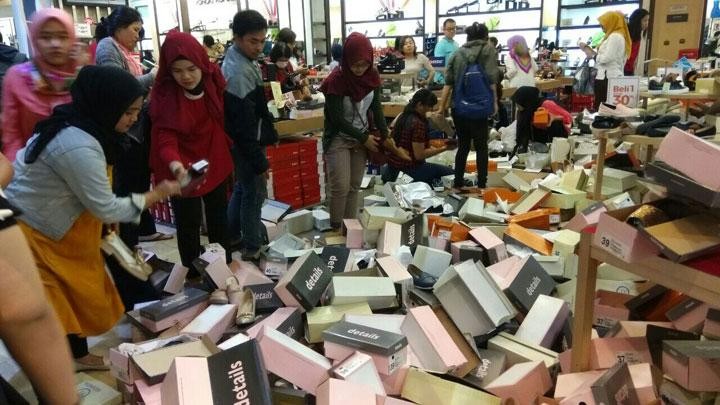Popular Reads
Top Results
Can't find what you're looking for?
View all search resultsPopular Reads
Top Results
Can't find what you're looking for?
View all search resultsVacancies rise among offline retailers from stiff online competition
Change text size
Gift Premium Articles
to Anyone
T
he offline retail sector is projected to see further impact as a result of tough online competition, as indicated by the growing vacancy rate among retail spaces in Jakarta.
According to a study by property consulting firm Savills Indonesia, the retail space vacancy rate increased year-on-year (yoy) to 12.7 percent in September 2018 from 11.3 percent in 2017, while the monthly commercial rent declined 2 percent yoy to Rp 350,000 (US$23.97) per square meter.
“The rise is not significant, but it indicates that the increasing trend in online shopping has begun to take its toll on commercial tenancy,” Savills research and consultancy head Anton Sitorus said recently.
According to data from Similarweb, unique visits to e-commerce platforms grew significantly during the third quarter. For example, visitors to Tokopedia increased 37 percent from the previous quarter, while Shopee and Bukalapak saw respective growth in visits at 26 percent and 13 percent.
Anton explained that the decrease in commercial tenancy in turn caused a decline in customers to physical stores, thus reducing the demand for commercial leases. “Consequently, to attract tenants under such conditions, malls have no choice but to lower their rent,” he said.
He said department stores in Jakarta were suffering the most from the development of online marketplaces because of their failure to attract customers through the "old-school format", overpriced products and inability to provide practical shopping experiences.
Meanwhile, Savills estimated that around 320,000 square meters of new retail spaces would enter the market through 202. Upper-class malls would contribute 54 percent to future retail space supplies, while middle- to upper-class malls will account for 46 percent.
“There’s a big project coming up in 2020,” said Anton, without providing any details.
Savills projects a significant rise in vacancy rates in 2020, when the market would see a boom in the supply of retail space. Rental costs would likely see an increase of 1 to 2 percent per annum until 2021. (bbn)










